
Jefferson Starship is an American rock band from San Francisco, California, formed in 1974 by a group of musicians including former members of Jefferson Airplane. Between 1974 and 1984, they released eight gold or platinum-selling studio albums, and one gold-selling compilation. The album Red Octopus went double-platinum, reaching No. 1 on the Billboard 200 chart in 1975. The band went through several major changes in personnel and genres through the years while retaining the Jefferson Starship name. The band name was retired in 1984, but it was picked up again in 1992 by a revival of the group led by Paul Kantner, which has continued since his death in 2016.
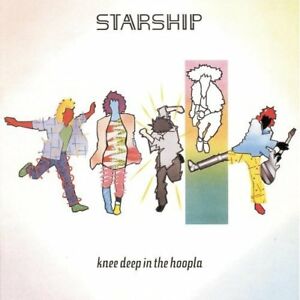
Knee Deep in the Hoopla is the debut studio album by American AOR band Starship, the succeeding musical project to Jefferson Starship. It was released on September 12, 1985, through record label Grunt. Four singles were released from the album: the No. 1 hits "We Built This City" and "Sara", "Tomorrow Doesn't Matter Tonight" and "Before I Go".

No Protection is the second studio album by American rock band Starship. It was released on July 6, 1987, by Grunt Records and RCA Records. The album featured the number-one single "Nothing's Gonna Stop Us Now", and the top-10 single "It's Not Over ", the former of which appears in the fantasy comedy film Mannequin and the latter of which was a tune originally performed the previous year by one-time Manfred Mann's Earth Band frontman Chris Thompson for the soundtrack to the film Playing for Keeps. Third single "Beat Patrol" was #46 on Billboard's Hot 100.

Nuclear Furniture is the eighth album by American rock band Jefferson Starship, released in June 1984 through Grunt Records. It was the final album by the band before the departure of leader Paul Kantner and the eventual transition of the remaining members of the group to become Starship.

Starship is an American rock band from San Francisco, California. Initially a continuation of Jefferson Starship, it underwent a change in musical direction, the subsequent loss of personnel, and a lawsuit settlement that led to a name change. Starship's 1985 album, Knee Deep in the Hoopla, was certified platinum by the RIAA, and included two singles that went to number one on the US Billboard Hot 100 chart: "We Built This City" and "Sara". Their follow up album, No Protection, released in 1987, was certified gold and featured the band's third number one single, "Nothing's Gonna Stop Us Now". After a short hiatus in the early 1990s, the band reformed in 1992 as "Starship featuring Mickey Thomas" and resumed touring.

Craig Clinton Chaquico is an American guitarist, songwriter, and composer. From 1974 to 1990 he was lead guitarist for the rock bands Jefferson Starship and Starship. In 1993, he started a solo career as an acoustic jazz guitarist and composer.
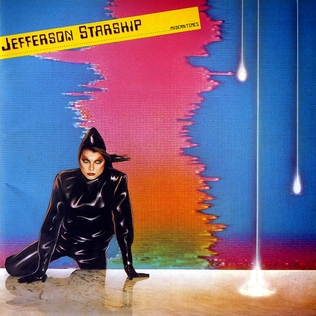
Modern Times is the sixth album by Jefferson Starship and was released in 1981. Grace Slick appeared on this album after a three-year absence. She returned near the end of the recording sessions, providing background vocals on some tracks as well as lead vocals on the single "Stranger" as a duet with lead singer Mickey Thomas. "Stranger" had previously been performed live by Jefferson Starship as early as December 1979, and the first studio version was made for Modern Times. Although not appearing in the band picture on the gatefold cover, Slick is listed on the back cover of the LP with the credit "Introducing Grace Slick" and her picture is on the lyric sleeve with the note "Grace Slick courtesy of Grace Slick." She joined the band officially for the 1981 tour. This was the first Jefferson Starship album to have promotional music videos. It was also the first album to feature a charting single on the Mainstream Rock Tracks chart, which had premiered earlier in the year. The single "Find Your Way Back" reached No. 3 on the Mainstream Rock chart.

Red Octopus is the second album by American rock band Jefferson Starship, released on Grunt Records in 1975. Certified double platinum by RIAA in 1995, it is the best-selling album by any incarnation of Jefferson Airplane and its spin-off groups. The single "Miracles" was the highest-charting single any permutation of the band had until Starship's "We Built This City" a decade later, ultimately peaking at No. 3 on the Billboard singles chart; the album itself reached No. 1 for four non-consecutive weeks on the Billboard 200. As was common in the era, stereo and quadraphonic mixes of the album were released concurrently.
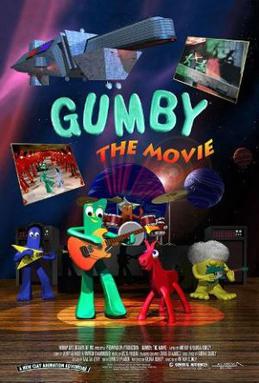
Gumby: The Movie is a 1995 American stop-motion surrealist claymation adventure comedy film featuring Gumby. The film is dedicated to Sri Sathya Sai Baba.
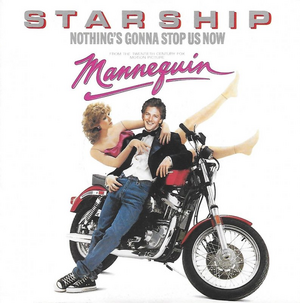
"Nothing's Gonna Stop Us Now" is a song co-written by Diane Warren and Albert Hammond and recorded by American rock band Starship for their second studio album, No Protection (1987). It is a power ballad duet featuring vocalists Grace Slick and Mickey Thomas and is the theme to the romantic-comedy film Mannequin.
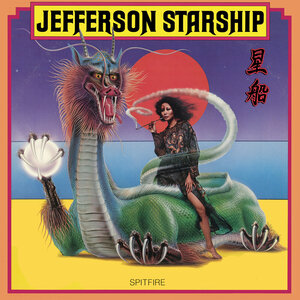
Spitfire is the third album by American rock band Jefferson Starship. Released in 1976, a year after the chart-topping Red Octopus, it quickly scaled the charts, peaking for six consecutive weeks at No. 3 in Billboard and attaining a RIAA platinum certification. The album features writing contributions from members of singer Marty Balin's former band Bodacious DF, as well as Jesse Barish, who became one of Balin's frequent collaborators. Stereo and quadraphonic mixes of the album were released. "Song to the Sun" was included in the 1977 Laserock program.
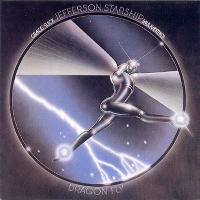
Dragon Fly is the debut album by Jefferson Starship, released on Grunt Records in 1974. It peaked at No. 11 on the Billboard 200, and has been certified a gold album. Credited to Grace Slick, Paul Kantner, and Jefferson Starship, the band itself was a turning point after a series of four albums centering on the partnership of Kantner and Slick during the disintegration of Jefferson Airplane through the early 1970s.

Flight Log (1966–1976) is a compilation album by the American rock band Jefferson Airplane. Released in January 1977 as a double-LP as Grunt CYL2-1255, it is a compilation of Jefferson Airplane and Airplane-related tracks, including tracks by Jefferson Starship and Hot Tuna, as well as solo tracks by Paul Kantner, Grace Slick, and Jorma Kaukonen. Although primarily a compilation album, the album includes one previously unreleased song: "Please Come Back" written by Ron Nagle and performed by Jefferson Starship. "Please Come Back" is not available on any other release.
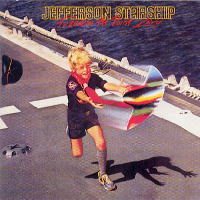
Freedom at Point Zero is the fifth album by American rock band Jefferson Starship, released in 1979. It was the first album for new lead singer Mickey Thomas, and the first after both Grace Slick and Marty Balin left the previous year. Aynsley Dunbar plays drums on this album; he had left Journey the previous year. The album cover was shot on location in the San Francisco Bay on board the USCGC Midgett.
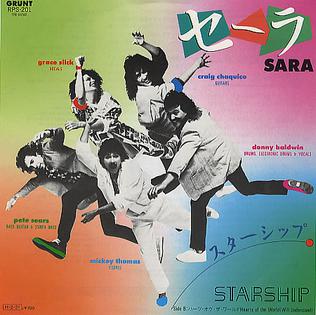
"Sara" is a song recorded by the American rock band Starship which reached number-one on the U.S. Billboard Hot 100 chart on March 15, 1986. It was sung by Mickey Thomas, of the newly renamed band Starship, from their first album Knee Deep in the Hoopla, and Grace Slick provided the backing vocals.

Earth is the fourth album by American rock band Jefferson Starship. The album was recorded in 1977, with the same band lineup as the previous album, Spitfire and released in 1978.

David Freiberg is an American musician best known for contributing vocals, keyboards, electric bass, rhythm guitar, viola and percussion as a member of Quicksilver Messenger Service, Jefferson Airplane, and Jefferson Starship. Among other tracks, he co-wrote "Jane", a hit for Jefferson Starship.

"Miracles" is a song written by Marty Balin and originally recorded by Jefferson Starship, appearing on its 1975 album Red Octopus.
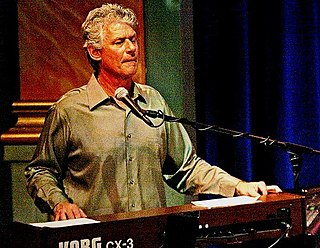
Ozzie Ahlers is an American songwriter and music producer who plays the keyboard, guitar, and bass. In addition to a solo career, he has played keyboards with Van Morrison, Jerry Garcia. and Craig Chaquico.

Acoustic Planet is the second solo album by American guitarist, producer, and composer Craig Chaquico. It was released a year after his first solo album, Acoustic Highway.




















